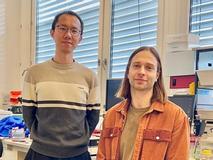CHF 10,000 for an innovative instrument for food and product screening, a novel diagnostics based on single-molecule nanofluidics, next-gen quantum computers, a breakthrough edible hydrogel platform, and highly efficient thermal energy storage
29.09.2025
Chromnil, MOLECL, Qendra, TUUS, and Vulkn Energy were selected at the first financial and entrepreneurial support stage of Venture Kick. Their projects integrate all high-performance thin-layer chromatography (HPTLC) steps such as sample application, development, detection, and image processing, into a single device with dedicated software; address a global biomolecule characterization market worth over USD 50B annually, with urgent demand for faster, more precise, and scalable solutions; provide a dedicated control system that bridges the classical and quantum worlds; build a breakthrough edible hydrogel platform for constant release of active compounds; and offer a long-duration storage converting cheap intermittent renewable energy & waste heat into on-demand heat and steam, replacing fossil fuels.
 |
 Chromnil: CEO Daniel Lehmann, COO Francesca Burlini, and CIO Jan Morlock
|
 MOLECL: CTO Nianduo Cai and CEO Andrey Chernev
|
 QENDRA: CEO Dr. Martin Stadler and COO Dr. Ferdinand Felder
|
 TUSS Nutrition: Co-founders CTO Pietro Nasturzio and CEO Tiziano Caldara
|
 Vulkn Energy: Co-founders Charles Little and Maria Lisiakova
|
Chromnil: Helping laboratories detect hidden threats, faster and cheaper
Chromnil addresses the lack of affordable and space-efficient high-performance thin-layer chromatography (HPTLC) analysis. Traditional methods require multiple separate devices, making testing complex, time-intensive, and expensive. As a result, harmful substances often remain undetected in food, cosmetics, and other consumer products.
Founded by Jan Morlock, Francesca Burlini, and Daniel Lehmann, chromnil integrates all HPTLC steps (sample application, development, detection, and image processing) into a single device with dedicated software. Additionally, it enables the use of bioassays directly on the plate, allowing for the identification of the toxic effects of unknown substances. The compact design reduces complexity, saves laboratory space, and simplifies everyday use. This opens HPTLC analysis to smaller labs, universities, and corporate R&D and QC teams across industries. With more than 7,500 labs worldwide that can benefit from this technology, chromnil provides a modern, sustainable, and highly accessible solution.
Venture Kick funds will allow chromnil to optimize both hardware and software, and to build a fully functional demo device. This milestone will enable the startup to present its innovation to customers and accelerate market entry. chromnil.com
MOLECL: Novel diagnostics based on single-molecule nanofluidics
Currently, detection of protein modifications is slow, expensive, and often lacks site-specific resolution. This results in late-stage diagnostics of cancer, neurodegenerative, and autoimmune diseases, as well as costly batch-to-batch variations in biopharmaceutical production.
MOLECL develops a novel diagnostic technology based on single-molecule nanofluidics. The startup is founded by CEO Dr. Andrey Chernev and CTO Nianduo Cai, experts in solid-state nanopores and start-up development, supported by a technical team with expertise in single-molecule measurements and data science. The innovation addresses a global biomolecule characterization market worth over USD 50B annually, with urgent demand for faster, more precise, and scalable solutions.
The Venture Kick funds will be dedicated to business development, including engagement with early adopters, securing LOIs, forming an advisory board with key opinion leaders, and building a robust sales strategy.
QENDRA: Powering the next generation of quantum computers
Quantum computers will revolutionize drug discovery, logistics, and climate modelling by harnessing quantum mechanics. Trapped-ion and neutral-atom quantum computers are among the most advanced, but they lack reliable, scalable control systems.
QENDRA provides the missing link: a dedicated control system that bridges the classical and quantum worlds. Built from technology developed in the trapped ion quantum information group at ETH Zurich, their MVP offers unmatched efficiency and rapid setup times. CEO Dr. Martin Stadler, COO Dr. Ferdinand Felder, and lead developer Chidzahi Mabritto, together with a team of scientists and engineers, are bringing this innovation to market. With growing demand from research groups and startups, QENDRA is poised to serve a fast-expanding global quantum computing market.
The Venture Kick funds will help QENDRA engage new customers, build a solid IP strategy, and advance CE certification of its MVP. qendratech.com
Tuus: Enabling athletes to perform at their best today, and empowering broader health solutions tomorrow
Endurance athletes often rely on energy gels that trigger sugar spikes, stomach distress, and uneven performance. Tuus addresses this by introducing a controlled-release hydrogel that ensures stable energy delivery without compromising health.
Founded by chemists Pietro Nasturzio and Tiziano Caldara, Tuus combines expertise in materials science, nutrition, and drug delivery. Supported by advisors from academia, sports medicine, industry, and design, the team has built a breakthrough edible hydrogel platform for constant release of active compounds. The first application is a next-generation energy gel, now entering clinical trials with athletes, marking a decisive step toward healthier endurance fueling. Beyond sports, the same platform can be applied in nutraceuticals and pharmaceuticals, where controlled release has the potential to transform health and well-being.
Tuus will use the Venture Kick funds to advance customer testing with precise glucose monitoring equipment, prototype for industrial integration with manufacturing partners, cover licensing contract negotiation fees with lawyers, and support investor networking.
Vulkn Energy: Thermal energy storage to decarbonize industrial heat - reliably, affordably, and at scale
Industrial heat accounts for 18% of total global emissions and CHF 1 trillion in annual spending. Yet, 20-50% of this heat is wasted. A new approach to industrial heat is needed: one that lowers emissions, costs, and waste.
Vulkn Energy’s team composed of CEO Maria Lisiakova and CTO Charles Little is developing highly efficient thermal energy storage using proprietary concrete. Designed for industrial processes below 600°C, this long-duration storage converts cheap intermittent renewable energy & waste heat into on-demand heat and steam, replacing fossil fuels. According to the team, the Vulkn solution lowers the cost of heat by 50%, improves supply stability, and reduces carbon emissions. Thanks to the abundance and low cost of input materials, it has low manufacturing and technology risks and requires minimal maintenance. Vulkn’s thermal energy storage is ideal for the pharmaceutical, pulp and paper, manufacturing, food and beverage, and tobacco sectors, which together spend about CHF 45 billion annually on sub-600 °C process heat in Europe.
The Vulkn team plans to use Venture Kick funds to advance its thermal modelling and business development.
Chromnil addresses the lack of affordable and space-efficient high-performance thin-layer chromatography (HPTLC) analysis. Traditional methods require multiple separate devices, making testing complex, time-intensive, and expensive. As a result, harmful substances often remain undetected in food, cosmetics, and other consumer products.
Founded by Jan Morlock, Francesca Burlini, and Daniel Lehmann, chromnil integrates all HPTLC steps (sample application, development, detection, and image processing) into a single device with dedicated software. Additionally, it enables the use of bioassays directly on the plate, allowing for the identification of the toxic effects of unknown substances. The compact design reduces complexity, saves laboratory space, and simplifies everyday use. This opens HPTLC analysis to smaller labs, universities, and corporate R&D and QC teams across industries. With more than 7,500 labs worldwide that can benefit from this technology, chromnil provides a modern, sustainable, and highly accessible solution.
Venture Kick funds will allow chromnil to optimize both hardware and software, and to build a fully functional demo device. This milestone will enable the startup to present its innovation to customers and accelerate market entry. chromnil.com
MOLECL: Novel diagnostics based on single-molecule nanofluidics
Currently, detection of protein modifications is slow, expensive, and often lacks site-specific resolution. This results in late-stage diagnostics of cancer, neurodegenerative, and autoimmune diseases, as well as costly batch-to-batch variations in biopharmaceutical production.
MOLECL develops a novel diagnostic technology based on single-molecule nanofluidics. The startup is founded by CEO Dr. Andrey Chernev and CTO Nianduo Cai, experts in solid-state nanopores and start-up development, supported by a technical team with expertise in single-molecule measurements and data science. The innovation addresses a global biomolecule characterization market worth over USD 50B annually, with urgent demand for faster, more precise, and scalable solutions.
The Venture Kick funds will be dedicated to business development, including engagement with early adopters, securing LOIs, forming an advisory board with key opinion leaders, and building a robust sales strategy.
QENDRA: Powering the next generation of quantum computers
Quantum computers will revolutionize drug discovery, logistics, and climate modelling by harnessing quantum mechanics. Trapped-ion and neutral-atom quantum computers are among the most advanced, but they lack reliable, scalable control systems.
QENDRA provides the missing link: a dedicated control system that bridges the classical and quantum worlds. Built from technology developed in the trapped ion quantum information group at ETH Zurich, their MVP offers unmatched efficiency and rapid setup times. CEO Dr. Martin Stadler, COO Dr. Ferdinand Felder, and lead developer Chidzahi Mabritto, together with a team of scientists and engineers, are bringing this innovation to market. With growing demand from research groups and startups, QENDRA is poised to serve a fast-expanding global quantum computing market.
The Venture Kick funds will help QENDRA engage new customers, build a solid IP strategy, and advance CE certification of its MVP. qendratech.com
Tuus: Enabling athletes to perform at their best today, and empowering broader health solutions tomorrow
Endurance athletes often rely on energy gels that trigger sugar spikes, stomach distress, and uneven performance. Tuus addresses this by introducing a controlled-release hydrogel that ensures stable energy delivery without compromising health.
Founded by chemists Pietro Nasturzio and Tiziano Caldara, Tuus combines expertise in materials science, nutrition, and drug delivery. Supported by advisors from academia, sports medicine, industry, and design, the team has built a breakthrough edible hydrogel platform for constant release of active compounds. The first application is a next-generation energy gel, now entering clinical trials with athletes, marking a decisive step toward healthier endurance fueling. Beyond sports, the same platform can be applied in nutraceuticals and pharmaceuticals, where controlled release has the potential to transform health and well-being.
Tuus will use the Venture Kick funds to advance customer testing with precise glucose monitoring equipment, prototype for industrial integration with manufacturing partners, cover licensing contract negotiation fees with lawyers, and support investor networking.
Vulkn Energy: Thermal energy storage to decarbonize industrial heat - reliably, affordably, and at scale
Industrial heat accounts for 18% of total global emissions and CHF 1 trillion in annual spending. Yet, 20-50% of this heat is wasted. A new approach to industrial heat is needed: one that lowers emissions, costs, and waste.
Vulkn Energy’s team composed of CEO Maria Lisiakova and CTO Charles Little is developing highly efficient thermal energy storage using proprietary concrete. Designed for industrial processes below 600°C, this long-duration storage converts cheap intermittent renewable energy & waste heat into on-demand heat and steam, replacing fossil fuels. According to the team, the Vulkn solution lowers the cost of heat by 50%, improves supply stability, and reduces carbon emissions. Thanks to the abundance and low cost of input materials, it has low manufacturing and technology risks and requires minimal maintenance. Vulkn’s thermal energy storage is ideal for the pharmaceutical, pulp and paper, manufacturing, food and beverage, and tobacco sectors, which together spend about CHF 45 billion annually on sub-600 °C process heat in Europe.
The Vulkn team plans to use Venture Kick funds to advance its thermal modelling and business development.


